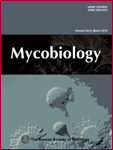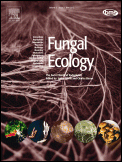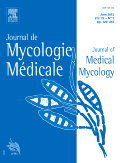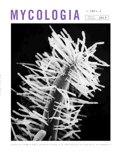
Journal of Fungi
metrics 2024
Innovating Understanding in Fungal Biology
Introduction
Journal of Fungi is a premier open-access journal published by MDPI, dedicated to advancing the understanding of fungal biology in its myriad forms. Since its inception in 2015, it has become a vital resource in the fields of ecology, evolution, and plant sciences, attaining notable rankings in Scopus, including Q1 status in Ecology, Evolution, Behavior and Systematics, and Plant Science, with a Q2 ranking in Microbiology (medical). The journal fosters a collaborative platform for researchers, professionals, and students by providing unrestricted access to high-quality, peer-reviewed articles, which encourages the dissemination of innovative findings and methodologies relevant to fungal research. Designed to cater to a global audience, the Journal of Fungi has established its significance in the scientific community, especially from its base in Switzerland, where it continues to contribute to the ongoing discourse in mycology and beyond. With its commitment to open access since its launch and its continuous support for groundbreaking research, the journal plays a crucial role in driving forward the scientific inquiry and ecological awareness in fungal studies.
Metrics 2024
 -
- 4.20
4.20 4.50
4.50 -
-Metrics History
Rank 2024
IF (Web Of Science)
JCI (Web Of Science)
Quartile History
Similar Journals

MYCOSCIENCE
Connecting Ecology and Evolution Through Fungal ResearchMYCOSCIENCE, published by the Mycological Society of Japan, is a prominent peer-reviewed journal that serves as an essential resource in the fields of ecology, evolution, behavior, and systematics, highlighted by its Q2 ranking in the 2023 category quartiles. Established in 1994 and continuing through 2024, the journal focuses on mycological research, providing insights into the interconnected worlds of fungi and their ecological roles. With an ISSN of 1340-3540 and an E-ISSN of 1618-2545, MYCOSCIENCE aims to disseminate high-quality research that addresses current issues and trends within the discipline. Despite not being an open-access journal, it makes a significant contribution to advancing fungal biology and its applications in agriculture and environmental science, making it an invaluable asset for researchers, professionals, and students alike. Located in the vibrant academic environment of Tokyo, Japan, MYCOSCIENCE stands out for its dedication to fostering a deeper understanding of mycology and its implications for biodiversity and ecosystem health.

Frontiers in Fungal Biology
Advancing Mycology Through Innovative ResearchFrontiers in Fungal Biology is an innovative academic journal dedicated to advancing the field of mycology and its interdisciplinary connections, published by FRONTIERS MEDIA SA. With an E-ISSN of 2673-6128, this journal focuses on exploring diverse aspects of fungal biology, including ecological roles, evolutionary processes, and interactions with other organisms. Since its inception in 2020, Frontiers in Fungal Biology has garnered attention within the scientific community, earning a commendable Q2 ranking in both Ecology, Evolution, Behavior and Systematics, and Environmental Science categories in 2023, alongside respectable Q3 rankings in Infectious Diseases and Microbiology. The journal is committed to open access principles, making cutting-edge research freely available to a global audience, promoting knowledge sharing and collaboration. By providing a platform for rigorous research and impactful discussions, Frontiers in Fungal Biology aims to enhance the understanding of fungi and their significant roles in ecosystems, health, and biotechnology, appealing to researchers, professionals, and students alike.

MYCOBIOLOGY
Unveiling the Secrets of Fungal BiologyMYCOBIOLOGY is an esteemed open-access journal published by Taylor & Francis Ltd, specializing in the fields of Infectious Diseases, Microbiology, and Plant Science. Since its inception, the journal has provided a platform for innovative research, showcasing a diverse range of studies that delve into the complexities of mycology and its vast implications on health, agriculture, and the environment. With a commendable impact factor and a Q2 ranking in Plant Science as of 2023, MYCOBIOLOGY facilitates the dissemination of vital findings to a global audience of researchers, professionals, and students. In addition to its commitment to high-quality content, MYCOBIOLOGY has embraced open access since 2018, ensuring that the latest advancements in mycological research are readily available to the academic community and the public. By bridging gaps in knowledge and fostering collaboration across disciplines, MYCOBIOLOGY plays a crucial role in advancing our understanding of fungal biology and its myriad applications.

Mycosphere
Empowering the global mycology community with open access.Mycosphere is a premier open-access journal published by MYCOSPHERE PRESS, dedicated to advancing the field of mycology and contributing significant insights into ecological and plant sciences. Established in 2010 and headquartered in Guiyang, China, this journal has carved out a vital niche, achieving remarkable rankings in the Scopus database—#3 in Ecology, Evolution, Behavior and Systematics and #4 in Plant Science, both boasting a 99th percentile ranking. With an unwavering commitment to disseminating high-quality research, Mycosphere serves as a critical platform for researchers, professionals, and students alike, encouraging robust dialogue and collaborations across the global scientific community. The journal's accessibility, coupled with its impact factor and Q1 categorizations in 2023 for both ecology and plant sciences, substantiate its role as an essential resource for cutting-edge studies and innovations in the field.

Fungal Ecology
Unveiling the Ecological Significance of FungiFungal Ecology, published by Elsevier Science Ltd, is a leading international journal dedicated to the exploration and advancement of our understanding of fungal biology and its ecological significance. With an impressive impact factor and recognized in the second quartile (Q2) across various categories such as Ecological Modeling, Ecology, Ecology, Evolution, Behavior and Systematics, and Plant Science, this journal offers a critical platform for researchers and professionals to disseminate and discuss innovations in fungal ecology. Since its inception in 2008, the journal has built a solid reputation, particularly highlighted by its impressive Scopus rankings, including a top percentile status in ecological fields. Researchers are encouraged to submit their findings that contribute to the understanding of the ecological roles of fungi, their interactions within ecosystems, and their applications in environmental science. Although the journal does not offer open access, it remains a vital resource for academics and practitioners aiming to stay ahead in the rapidly evolving fields of fungal research and ecology. Located in the vibrant heart of the Netherlands, the journal continues to foster scholarly engagement and collaboration among scientists globally.

Malaysian Journal of Microbiology
Pioneering Research in Infectious Diseases and Microbial ProcessesMalaysian Journal of Microbiology is a prestigious open-access journal dedicated to advancing the field of microbiology, published by the Malaysian Society for Microbiology. Since its inception in 2005, this journal has become an essential platform for researchers and practitioners, facilitating the dissemination of innovative studies in applied microbiology, biotechnology, and infectious diseases. Based in Penang, Malaysia, this journal not only focuses on local microbiological research but also positions itself within the broader global scientific community. Although currently placed in the Q4 category in several relevant fields—including Applied Microbiology and Biotechnology, Infectious Diseases, and Medical Microbiology according to the 2023 Scopus rankings—it plays a crucial role in encouraging novel research and fostering collaboration among scientists. The journal encourages submissions that contribute to the understanding of microbial processes, disease mechanisms, and novel biotechnological applications, thereby supporting the continuous growth of knowledge in microbiology. With open access since its launch, the Malaysian Journal of Microbiology ensures that all published works are freely available to the public, enhancing their visibility and impact within the scientific community.

JOURNAL DE MYCOLOGIE MEDICALE
Empowering Knowledge in Fungal PathologyJOURNAL DE MYCOLOGIE MEDICALE is a premier publication in the field of infectious diseases, particularly focusing on the study of mycology and its clinical implications. Published by MASSON EDITEUR, this esteemed journal is based in France and has been disseminating valuable research since its inception in 1994. With an ISSN of 1156-5233 and an E-ISSN of 1773-0449, it plays a critical role in advancing knowledge in mycological infections, positioning itself in the Q3 category for infectious diseases as per the 2023 quartiles. As indicated by its ranking in Scopus, ranking #142 out of 344 in the medicine-infectious diseases category, the journal maintains a prominent presence within the academic community, appealing to researchers, healthcare professionals, and students alike. Although access options are not open access, the journal endeavors to promote a deeper understanding of mycological studies that are crucial for combating ongoing and emerging infectious threats. As it continues to converge on new findings up to 2024, JOURNAL DE MYCOLOGIE MEDICALE remains an essential resource for those invested in the critical intersections of mycology and medicine.

JOURNAL OF BASIC MICROBIOLOGY
Driving Discoveries in Basic MicrobiologyJOURNAL OF BASIC MICROBIOLOGY is a premier publication in the field of microbiology, published by WILEY since 1985. With a significant presence in Germany, this journal encompasses a wide spectrum of research topics, focusing on applied microbiology and biotechnology as well as diverse areas within medicine. Holding a commendable Q2 ranking in both its categories for 2023, it plays a crucial role in disseminating innovative findings and methodologies to the community. Researchers will find it to be an essential platform for sharing high-quality work, where it currently stands at rank #47 in the applied microbiology and biotechnology category, representing the 63rd percentile among international journals. The JOURNAL OF BASIC MICROBIOLOGY caters to a growing audience of professionals and students, offering insights essential for advancement in microbiological research and its applications. While it does not currently offer an Open Access option, it remains an influential outlet for academic excellence, continuously contributing to the development of the field through its rigorous peer-reviewed articles.

SYDOWIA
Advancing Ecological Insights for a Sustainable FutureSYDOWIA is a prestigious academic journal based in Austria, published by Verlag Ferdinand Berger Sohne Gesellschaft mbH, that has been a cornerstone of scientific publishing since its establishment in 1996. With an ISSN of 0082-0598, SYDOWIA focuses on critical research in the fields of Ecology, Evolution, Behavior and Systematics as well as Plant Science, earning a notable classification in Category Quartiles with Q3 in Ecology-related disciplines and Q2 in Plant Science for 2023. The journal’s strategic insights into agricultural and biological sciences have secured a place within the Scopus rankings, where it holds the position of #191 out of 516 in Plant Science and #278 out of 721 in Ecology categories—reflecting its growing influence with a percentile standing of 63rd and 61st, respectively. Although SYDOWIA is not an Open Access journal, it continues to thrive in delivering scholarly articles that promote advancement and innovation in ecological and botanical research. Researchers, professionals, and students alike can rely on SYDOWIA as a vital resource for disseminating knowledge and fostering exploration in these essential scientific domains.

MYCOLOGIA
Unraveling the mysteries of mycology since 1945.MYCOLOGIA, published by Taylor & Francis Inc, is a prestigious journal that has been at the forefront of fungal research since its inception, with converging years of publication from 1945 to 2024. This interdisciplinary journal, identified by ISSN 0027-5514 and E-ISSN 1557-2536, stands out in various scientific categories, achieving Q1 rankings in Ecology, Evolution, Behavior and Systematics, as well as Plant Science, alongside strong performances in Cell Biology and Molecular Biology categories. With an impact factor that reflects its significance in the field, MYCOLOGIA appeals to a diverse audience, including researchers, professionals, and students dedicated to advancing the understanding of fungal biology and its ecological implications. Notably, while it does not currently operate under an Open Access model, the journal remains a vital resource for those pursuing groundbreaking discoveries in mycology and related disciplines.